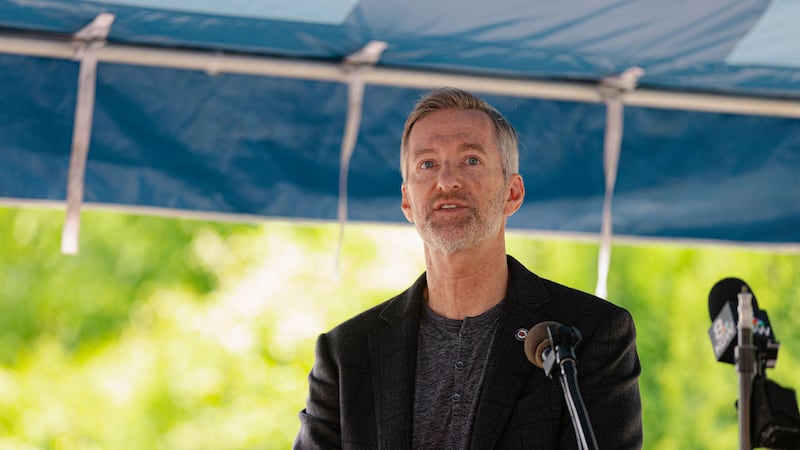Last week, Mayor Ted Wheeler presented a five-part plan to end camping on the streets of Portland.
It included an ambitious set of goals, all of which are currently unfunded: build sanctioned campsites that accommodate 500 people, start construction on 20,000 units of affordable housing by 2033, ban unsanctioned camping, create diversion programs for camping citations to avoid a criminal record, and more.
The mayor’s office is in full-on recruitment mode for the money to fund these plans. It’s been in contact with Multnomah County Chair Deborah Kafoury, the two candidates vying for her job, and state lawmakers.
And WW has learned that since mid-October, regional government Metro and the mayor’s office have been in tense discussions over a touchy issue: how the tax dollars raised from a homeless services tax overseen by Metro are distributed among the three Portland-area counties. In short: The mayor wants Multnomah County to get a bigger chunk of the tax revenues than it currently does so the tax can help fund the mayor’s plan.
Voters passed the tax on businesses and high-income earners, called the supportive housing services measure, in 2020. As it stands, the three counties in the Portland metro area get dollars based on a projected estimate of each county’s percentage of tax paid by households (businesses are excluded from the calculus). Multnomah County gets 45.3%, Washington County gets 33.3%, and Clackamas County gets 21.3%. In its first year, the tax brought in $250 million.
But the mayor is shopping the idea of reallocating the money based on each county’s homeless population—or at least upping the amount Multnomah County gets—rather than its tax base, so the Portland area gets a bigger slice of the pie. That would redistribute the funds dramatically: 79% to Multnomah, 12% to Washington and 9% to Clackamas.
It appears the conversation between the two governments began Oct. 12, when mayoral aide Sam Adams emailed Metro and city staffers, asking what percentage of tax revenue each county brought in.
“We can do a high-level analysis of, for example, the address used on returns, but that will not necessarily reflect where the income- or profit-producing activity actually occurs,” wrote a city staffer. “We had pre-election discussions with the framers of the ballot measure about the difficulty of allocating tax receipts based on this and urged them to consider allocating based on population or some other known rational metric. That ultimately did not happen.”
That week, Metro Council chief of staff Kristin Dennis and mayoral staffers met about the concept.
Four days after that meeting, Dennis sent Adams and other Wheeler advisers a sharp email, explaining that no changes to the allocation could be formally discussed until after fiscal year 2022: “Changing the allocation on the timeline you are interested in is neither legally nor politically viable,” Dennis wrote.
On Oct. 18, after WW reported the mayor’s upcoming plan for major camping sites and a camping ban, Wheeler emailed mayors statewide about the leaked proposal—and said he wanted to take another look at the tax.
“Beginning next year, we hope to engage in the regional discussion surrounding Metro’s Supporting Housing Services tax allocation formula,” Wheeler wrote. “There is a process for determining the allocation of these funds, and I look forward to working with my fellow local officials to ensure the distribution reflects the need.”
The conversation between Metro and the mayor’s office became more heated the morning of Oct. 21, just hours before Wheeler was set to outline his five-part plan.
Mayoral chief of staff Bobby Lee texted Dennis and Peterson: “Heads up. The mayor may include in his speech—asking Metro to revisit the formula in 2023. I know this is a difficult issue. But he feels strongly on this.”
Dennis replied in a lengthy text: “Our colleagues at the city and county levels all believe that you want [Portland] to receive 80% of the funds and no communication from your office has done anything to dispel that belief...I get that you feel like you need to point to this as a potential funding source but I can’t emphasize enough that we do not need to change the allocation in order to address visible homelessness in Portland...this is shortsighted.”
Lee responded: “You can give him a call if you feel strongly. But he feels it’s reasonable to ask for consideration for a better regional formula.”
Dennis wrote back: “Better based on what? Concentrating homelessness in Portland and destabilizing/reducing new services in Washington and Clackamas homeless populations? Got it.”
Ten minutes later, Wheeler laid out his plans in a press conference. He did not mention a change in the allocation of homeless services tax dollars.
And last week, Wheeler and Peterson themselves spoke over the phone.
According to Metro spokesman Nick Christensen, Peterson and the mayor discussed that a reallocation of tax dollars could be revisited in 2023 by the three counties and Metro Council: “We have yet to see a reallocation proposal from the mayor’s office,” he added.
